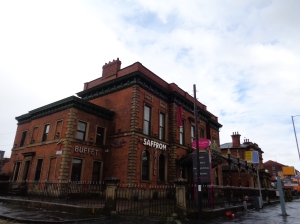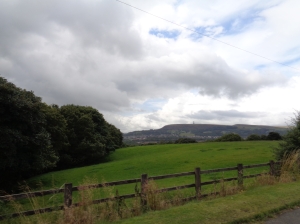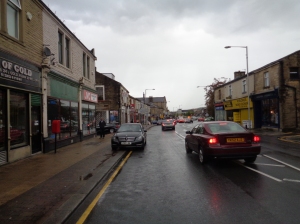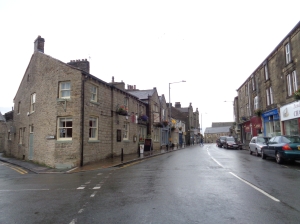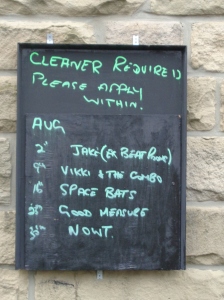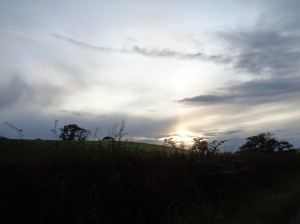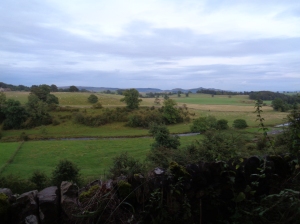‘That’s what I hate about the modern world. You see kids out on their mobile phones, and they’re not talking to each other. And their parents are doing the same. And we’re all guilty of it, together.’ – Lady in pub, Malham.
Hail the morning that arrived too soon. Farewell the night that never finished, misspent in writing, and thinking, and talking too late. Tiredness and fatigue, my companions. They decorate this stage-set called ‘reality’ in the tones of grey. Everything with a tired mind feels that little bit unhinged, as if someone’s whispered into one’s ear that tomorrow probably won’t roll around. Just look at these people, with their fancy hats and shoes, their long words and their urgent obligations. Why on earth are they all bothering, don’t they know that reality’s a joke at their expense?
Such is the stuff of madness and a sleep-deprived mind. I am up and about in Wythenshawe, a suburb on the southern tip of Manchester. I spend the morning talking with Amy and Saad. They’ve both got an urgent obligation at the Didsbury mosque that I visited the previous day, but they have the morning free from work. Amy tells me about her academic research. From what I gather, she’s investigating violent and threatening femininity through female killers, so often cast as misfortunate victims of abuse, unlike male serial killers. Such rhetoric disarms what could be threatening. This all comes up through a stupid cliché uttered by men (mostly) without personalities, the ‘smile love’ or ‘cheer up’ exhortation, usually made to a female passer-by or shop assistant.
As Amy argues, the smile as a physical expression bares the teeth benignly, and is an expression of not being threatening. ‘Why should I?’ or ‘fuck off mate’ would be appropriate responses. Amy recalls hearing this when her sister had just died. She was speechless. The person saying it couldn’t’ve known this, but it is always stupid and inappropriate. That women receive it more than men (or, well, if we get started, the everyday sexism of street harassment is a lived reality for most…) is ridiculous, offensive and out of line.
It gets us talking about the future. Those McDonalds drive-thrus that define these modern settlements called England, tribal markers of the mediocrity of the popular culture imposed from on high like some nutrient-deficient cattle fodder. The dour semi-detached houses, the retail parks, the spaghetti sprawl of roads, pylons and telegraph wires, the suburbs that could be anywhere except where you wanted to be.
The peoples of these islands have been greatly disserved by these architectures and the behaviours they allow to flourish, but what else is there? Across the social classes I’ve found a dogged contentedness with a civil religion based on work, retail shopping, internet media, and mental relief through alcohol consumption.
Those who don’t conform to this lifestyle are the outsiders, the immigrants. And yet human nature can be transformed, as it has been before. The origin of such transformations, be it a commercial or military technology, or a new form of artistic expression, or a political declaration of universal rights, is usually doubted at its inception, underestimated or belittled in its growth, and then championed as normality itself at its condensation.
Amy and Saad are learning Arabic together. She’s already fluent in French, and he can speak but not read Arabic. There’s mention of working overseas, of a future of another kind elsewhere. They’re lovely, kind people, and I wish them well. I leave their place and travel north along a route that’s starting to feel homely, whizzing through the Sharston industrial estate, heading north via Palatine Road and then Oxford Road, passing through Northenden, Fallowfield, Rusholme and the universities and into the centre. I stop for a snack and shelter as the rain unleashes itself on a city unaccustomed to unrequited sunlight. Then it’s up north, leaving Manchester for the last time. But one more port of call.
The Manchester Jewish Museum is based in the old Spanish and Portuguese Synagogue in Cheetham Hill, a suburb to the north of the city-centre. Worship ceased in or around 1982 after the congregation whittled down into non-existence, and was moved to Moor Lane in Salford. Practising Jews cannot ‘ride’ on the Sabbath, and so must live in walking-distance to the synagogue. Fortunately two years later the synagogue was reopened as a museum, where I am today, looking around at its beautiful adornments and talking with Alan, a local Jewish gentleman who guides us round the place.
We’re shown a Torah Scroll that survived being collected by Nazi Adolf Eichmann, who collected over one and a half thousand of these for a future exhibition he titled ‘Relics of a Defunct Culture’. There are numerous other scrolls and sacred objects, and Alan points out that the beautiful stained-glass windows here have no animal or human depiction on them, just scenes from the Bible, as part of their prohibitions against idolatry.
Without any prior suggestion, Alan begins to reflect on anti-Semitism at the moment, and he raises the recent occurrence of anti-Israeli protests in the centre of Manchester. George Galloway has recently declared the city of Bradford an ‘Israeli-free zone’. Alan doesn’t attach himself to Israel, but he feels very uncomfortable about the recent protests.
‘They think one Jew is responsible for another Jew. … But we’re all the same. We all want peace, we want to see our children do well.’
He feels that the boycott and the mood around it has made it unsafe for Jews to go into the city centre. He’s critical of recent news coverage of the situation in Gaza and worries that the Palestinian deaths may be overestimated. Whether one agrees or not, and I do not, there’s a separate problem here about anti-Semitism in Britain now, something that has anecdotally at least risen massively recently. There is now high security around prayers in Manchester’s synagogues. In May this year, a man from northern France entered the Jewish Museum in Brussels and shot four people dead.
Alan’s laid-back and a nice fellow to talk with. He describes the long two and a half hour prayers that take place each Saturday. With a cheeky laugh he discusses the ‘big hat brigade’ of Orthodox Jews living out in Prestwich, Whitefield and Bury. ‘It’s not a tradition’, he says, ‘it’s a seventeenth century Polish nobleman’s costume!’ Much of this community has resettled from other UK cities where the Jewish community has gone into decline, or migrated from other parts of Europe. But the country with the largest expanding Jewish population outside of Israel is Germany.
The museum is rich with intriguing artefacts and stories of the Jewish community in Manchester. It began to settle here from London from the late 18th century onwards, and grew quickly. Manchester’s booming industries attracted wealthy merchants from the Middle East to set up warehouses and eventually settle here, many of these Sephardic Jews originally hailing from Iberia. Ashkenazi Jews from central and eastern Europe began to also settle during the 19th century, running shops and working in various factories. This community spoke Yiddish, a dialect of Hebrew, and was to a large degree lived in greater poverty than their Iberian-origin cousins. Specifically Jewish welfare and healthcare programmes were established to relieve the destitution of this urban poor.
In this city defined by its contrasts, more so than even London, Zionism flourished during the first two decades of the 20th century. Chaim Weizmann lived and worked in the city between 1904-14, and his lobbying helped effect the Balfour Declaration of 1917, a typically slippery piece of British diplomacy that in the vaguest terms promised British support for ‘a national home for the Jewish people’ in Palestine.
Anecdotally, there’s some Jewish descent in me, and I leave with a couple of cards for individuals in organisations who can help with tracing family history, and head on. My destination is Masham in the Yorkshire Dales, where a family wedding is taking place. It’s around a hundred miles away, too far to ride comfortably in a day, and so my route is simply one that goes north-east, to Malham, a wee village I find on Google Maps. Who knows what lies there.
My ride takes me back along through the northern suburbs of Manchester, through Prestwich, Heaton Park and Whitefield, where one passes stores selling airguns, British-Chinese cuisine, spiritual wellbeing and countless dispensaries of cheap booze. Manchester continues in this same mood for some time, until the landscape clears its breath, coughs out some empty expanses of green, before beginning again with its mumbly mewey monologue of plain though a little affluent suburbia. Welcome to Bury.
It’s a small town in the orbit of Manchester, but has a distinctive enough sense of itself to avoid any neat comparison with its larger neighbour. It’s small, certainly, but its town centre is neatly planned and relatively pleasant. There’s a nearby college and a sufficient number of shops and bars. The local council has an optimistic public campaign called ‘I will if you will’, beckoning residents to get more active and participate. It’s hard to see if it’s successful, but there’s little rush or aggression about the place.
In the street, I talk to one smartly-dressed Londoner who has lived for some time here. My questions are open, though he zooms quickly on the relative qualities of this small town before leaping to prices of properties. ‘It’s a good place to live, but the house prices are expensive, more than what you’d think in the south’. Manchester’s tram service was connected up with here not so long ago and it made a ‘big difference’, turning Bury into a regional ‘hub, a place to be’.
The shops are plying a good trade it seems, and there are lots of young people about, but it’s hard to find out much more, as heavy rain begins to fall which drives everyone into the nearest doorway. It’s a small but unremarkable market town, though at its rear is a large outdoor mall development. It’s distinctly of this decade, a pseudo-plaza, pedestrianised with a couple of angular shapes, glassy fortifications and wavey lines thrown in. It’s pleasant, though comes from the same globalised made-in-China catalogue as the products its high-street stores flog. Content enough and dressed up in waterproofs, I continue north.
The landscape starts to become steep and rural, and my road lifts me up along a height affording perfect views of an formerly-industrial valley below. I see spindly brown brick chimneys in the distance, and I pass small cottages and terraced houses defined by their large, sooty bricks. As I pass these former textile villages, it becomes increasingly rare to see any kind of building over two storeys, as if respecting the superiority of the chimneys. There are very few churches, and it’s hard to imagine any kind of religious feeling taking root in the soot and hard graft of the textile work here. Survival was enough.
The road overlooks the settlements of Summerseat and Ramsbottom, and heads through the village of Edenfield before reaching Rawtenstall, a small ex-textile town in obvious decline. A large Asda supermarket now dominates the town centre, and unsurprisingly, the remaining retail streets are filled with to-let signs. There’s an obviously large population of elderly people here. I get talking to a smartly-dressed couple, Stephanie and Josh, to find out what’s under the surface of Rawtenstall. Stephanie’s local to here, whilst Josh is from Blackpool, though they both live in nearby Haslingden.
‘The town’s quiet, there’s not much going on. Look at the shops, I remember when they used to be all open. This used to be an alright place.’
‘What changed?’
‘Unemployment’s a problem, there’s just nowt to do.’
‘Cept on a Saturday night, people come out and get pissed. There’s some alright clubs, up there, and round there [gesturing], but there’s fights.’
‘And all the young ones come out, the ones who can’t get into the pubs. They just hang around outside, causing trouble.’
‘Just bored kids, with nothing to do, taking it out on whatever’s round them?’
‘Aye. That’s it.’
We smile about it, and they think I’m more familiar with the place than I actually am. A common problem here, simmering boredom, unemployment, and bad town centre management. They’re interested in my method of escape – theirs is university, studying forensic science and sports photography, respectively. They warn me about Burnley, ‘the centre’s nice, but it’s the estates outside. There’s gangs, a lot of trouble. You should be careful’, Josh says, his eyes gesturing to my panniers.
Burnley begins not long after Rawtenstall ends. The road suddenly dips into the deep valley where it’s situated, a surprisingly large town that looks utterly unremarkable, lacking no kind of landmark whatsoever. I plummet down into the town centre, thinly wrapped in a smear of uninspired and utterly functional housing. The newer Charter Walk shopping mall stands alongside a mixture of a small Victorian row of stores and some other ugly retail developments that my brain becomes too bored to focus on. Instead, I ask people milling around what their experiences are. One woman is a local of the town, and speaks with high regard for it.
‘I’ve got four sisters, they went to Canada, London, now they all want to come back here.’
‘Why, what particularly for?’
‘There’s something about it. It’s… home.’
I ask another lady, again born and brought up in the town. She speaks positively of the place until I ask about communities, when her expression becomes a little pained.
‘Unemployment, there’s a lot of unemployment. I’ve been looking for a long time, I might as well give up.’
‘Who employs around here?’
‘Dunno, I wish I did.’
‘These shops?’
‘Yeah, maybe.’
She’s not convinced. I walk out of the town centre and spy a number of curious old shops. Some carry murals above a selection of weird artefacts and antiques. Another is a home-brewing beer store, something that feels distinctly and nobly northern. There’s a derelict town hall that faces a large retail park on the other side of the motorway, and some ugly former industrial premises in the distance. It’s hard to feel the motivation to press further with Burnley, and I decide to crack on further north.
Rain falls hard in intervals across the day before taking a pause to gather up its strength. I reach Nelson, and realise I am riding through a certain social and architectural pattern of the Lancashire former milling town. These places share that same large yellow-brick building style, sturdy and stoic, no real concessions to artisanship or novelty. There are no prominent churches, and at best small chapels, though some of these settlements now boast beautiful and proud-looking mosques with little minarets, standing incongruously in valleys made up of sheep and disused factory chimneys. There’s nothing particularly prominent or remarkable about any of these settlements, yet they’re of a style that I’ve seen nowhere else. There are cheap takeaways open, a good number of curry houses and off-licences, but not the abundance of betting shops that characterises the inner London suburbs, or the chippies of the Scottish lowlands, or the British-Chinese takeaways and bargain booze outlets that ringed Manchester and the Midlands.
I’m looking around at all this from the side of a road when a car pulls by me. A man jumps out and asks me my bicycle. He’s a Leeds man, and smiles in disbelief, before introducing me to his wife, more distracted with protecting herself from the rain. ‘That’s made my day that. Where you heading? Malham! Ooh blimey, that’s a day out for us! We’d invite you in for a cup of tea but we’re only stopping, and the place is empty’. Aside from random friendliness there’s little else that sticks with Nelson. Carradice are based here, the British company which made my panniers, one of which broke in a matter of days, the other just about lasting out. I pass through Brierfield, another small industrial town with chimneys in the distance, before threading out again into open country.
I cross into West Yorkshire, and begin to pass cyclists rushing in the opposite direction. They are clad like bobsleigh athletes in typically ludicrous and tightly-fitted garb. Their heads are fixed down, headphones squished inside ears, minds pressed on personal bests. I am not quite sure why they are here and not the company gym. Clearly they’re trying hardest to block out any kind of sensory encounter with their surroundings. Sadly these are most often the cyclists I see on the roads. This philosophical and democratic method of travel needs reclaiming from this sorry kind of competitive and commercialised domination by older men anxious to affirm their masculinity.
The road north to Barnoldswick begins to intimate what the Dales might be all about. The ride is just lovely, a trail of rolling fields with the odd cluster of cattle or sheep. There are streaklings of rivers and hedgerows, the sun filtering through the gently cultivated fields. Small forests fade into the distance, and the rain clears to begrudgingly allow a dash of sunlight. The town itself is relatively quiet and pleasant, and I pass in and out, keen to keep enjoying this increasingly pretty countryside. It’s what I’d hoped for with the Lake District, but no matter, the pleasure is mine now. It’s tugging at my heart-strings, this promised land.
I gaze at the sunset, the music of Ornette Coleman providing the soundtrack to a satisfied yet sad set of moods. This sunset is suggestive of the power of what some would call god, or nature, or the infinite, or mere mystery, or mere mechanics, as they’ve been socialised to imagine. I get thinking about the infinite, which this sunset suggests, the infinity of days, months, years ahead, the infinity of experiences possible, of situations that could arise, of ideas and emotions that could in turn reconfigure the perception of these, of all the things I cannot understand, like the creation of this kestrel here, sitting on a post, returning my gaze, then taking flight, of the growth, death and growth again of the trees, of the brilliant golds of the sun, of the passage of these days.
Poets have taken sunsets like these, of states of physical exhaustion adding a brilliance to these sunsets, and made works of exquisite beauty from them. I feel I could adore the infinite, its mysterious production. But the Dales check me: adoring the infinite is to only adore the limit of our understanding. There’s nothing special about the darkness. Study it and it appears as degrees of deprivation of the light. Poets and mystics adore only the limits of the mind, a barrier that is moveable with experience and reflection. But there’s something I’m in love with on these kinds of afternoon-to-evening cyclogeographies, this evening heliosophy, whatever:
To love the excitement of not knowing, not experiencing, the pleasure of being on the cusp of that threshold before the experience, before it transforms you and the thing you’ve experienced. Each sensation and perception is a delight, but there’s more pleasure in not rushing, keeping something unknown. I hope to never have a day again where I haven’t discovered something new, of myself, of the people around me, of the landscape, of the workings of the natural world.
By way of pretty Gargrave and Coniston Cold I enter the Yorkshire Dales park, which is just as lovely as the name suggests. I pass through the pretty sunset village of Ainton, the mills behind, the rustic dales around me, with their ancient trees and dry-stone walls. I’m starting to tire, and realise I’ve cycled a little further than I would normally in a day. Still, it’s been an interesting ride, and the best is left over for last, lovely sleepy Malham, a village beneath a large limestone wall. With the regular and heavy rain, I’ve checked myself into a youth hostel here to dry out. The place is modern and well-appointed, and the staff friendly. I put my clothes in a drying room and myself in the nearby Lister arms for a couple of pints of the local Thwaites tipple and sit back, letting the mind’s eye unreel its captured quarry of strange and delightful thoughts.







